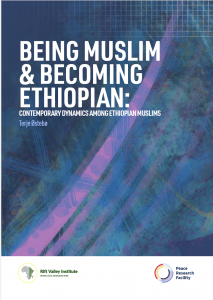By Terje Østebø
SUMMARY
In the wake of the Ethiopian People’s Revolutionary Democratic Front (EPRDF) gaining power in 1991, a religious resurgence driven by various Islamic reform movements produced a more active, visible Muslim community. Over time, the government came to regard this as evidence of increased extremism and launched the so-called ‘al-Ahbash’ campaign in 2011. The Muslim community, viewing this as unconstitutional interference in religious affairs, took to the streets of Addis Ababa to protest. These protests, which became known as Dimtsachen Yisema (‘Hear Our Voices’), were brutally suppressed by the authorities in August 2013.
Nevertheless, the protests birthed novel discourses about the meaning of democracy, civil rights and secularism, producing what can be referred to as the Dimtsachen Yisema generation, many of them young Muslims who have gone through higher education and entered the workforce. This engagement in broader Ethiopian society has prompted new questions around inter- religious relations, societal responsibility and political engagement, with young Muslims forced to negotiate what it means to be both a good Muslim and good Ethiopian.
While Abiy Ahmed’s religious policies following his ascendence in 2018 have further emboldened religious actors, many Protestant and Orthodox Christians view an increasingly active Muslim community as upsetting the balance between different religions. It is clear that Abiy Ahmed is less preoccupied than his predecessors by the spectre of extremism, enabling previously marginalized groups to move centre-stage—including installing senior Salafis to the leadership of the Ethiopian Islamic Affairs Supreme Council (EIASC).
Developments since the Muslim protests have also seen the emergence of a new category of actor, commonly referred to as the ustazes. Deeply pious, these young activists have managed to engage in debates on non-religious issues while still being considered good Muslims. In doing so, they have become influential religious role models. They have also critiqued Salafi teachings—which focus on religious purity—for being too narrow and failing to address the needs of the youth. This erosion of Salafi authority has led many senior Salafis to re-negotiate their earlier religious viewpoints.
This report was written for the Ethiopia Peace Research Facility (PRF). The PRF is an independent facility combining timely analysis on peace and conflict from Ethiopian experts with support for conflict sensitive programming in the country. It is managed by the Rift Valley Institute and funded by the UK government.




